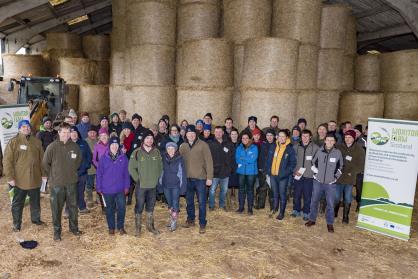
Borders Monitor Farm Builds Business Resilience

Being involved in the Monitor Farm Scotland programme has given the Mitchell family the confidence to make major changes to their farm business and help build the resilience needed to meet future challenges head on.
“As a result of approaching our business in a different way, we’re a lot more resilient and a lot more flexible,” commented Stuart Mitchell at the recent final meeting of their three-year Monitor Farm programme.
Whitriggs is one of nine Monitor Farms established in Scotland as part of a joint initiative by QMS and AHDB Cereals & Oilseeds, with funding from the Scottish Government. The aim of the Monitor Farm programme is to help improve the productivity, profitability and sustainability of Scottish farm businesses.
Over the course of the three-year programme, by making better use of inputs, reducing wastage and improving output, the Mitchells have reduced the carbon emissions associated with their cattle enterprise by 30%, and at the same time, their profitability has also increased to 38% of gross output.
The family run 170 Beef Shorthorn cross and Aberdeen Angus cross suckler cows and 300 deer across 442ha just outside Denholm in the Scottish Borders.
In 2018, Stuart took over the day-to-day management of the business, working alongside parents Robert and Lesley. Having the support of fellow farmers and industry experts as part of the Monitor Farm network has been instrumental in supporting Stuart during this succession phase.
“The meetings have been helpful in challenging my thoughts and giving me confidence in my decisions,” he said.
He explained to the 50 farmers and members of the local agricultural community attending the final meeting, that the family had made three main changes to the business over the course of the programme.
Firstly, the calving block has been condensed from ten to six weeks. In the first year this involved using synchronisation and artificial insemination to get late calvers calving at the start of the following block. Since then, stock bulls have been used. This has led to an increase in calving percentage, from 85% to 94% in the three-year period.
Stuart said: “Calves are a lot more uniform throughout the year, which makes routine work a lot easier as they’re roughly the same weight.”
Secondly, rather than finishing every animal, the Mitchells now decide whether to sell stock as stores or finished animals, depending on the market, therefore maximising returns, and output from the farm. Output from the beef enterprise has risen by 25% over the course of the Monitor Farm programme.
Finally, benchmarking the technical performance of the sheep flock at the start of the programme highlighted that sheep performance in the 1000-ewe flock was below average compared to similar systems. Working with vet Andrew Robinson, they screened the flock for Maedi Visna (MV) and discovered that some of the ewes were infected.
The flock was initially split into MV positive and negative groups, but when a high proportion in the negative group tested positive, they made the hard decision to cull all the ewes from the farm. Having already started a small deer herd, the Mitchells costed out business options with the Monitor Farms facilitators, and as a result the business is now increasing the numbers in the deer herd, rather than re-stocking with sheep.
The Borders Monitor Farm facilitator, Colin MacPhail from 5AgriGroup believes the Mitchells time as monitor farmers has been “a huge success”. He says the informal discussions and breakout sessions led by local farmers have been instrumental in ensuring everyone attending the events have left with practical, take home messages. Having a support network has also helped the Mitchells make significant changes.
“The business is more profitable than at the start. There are a few factors; they’re probably more conscious of cost, they’ve diversified into deer and their output has increased. Overall the business is just efficient, more profitable, and more sustainable,” commented Colin.

